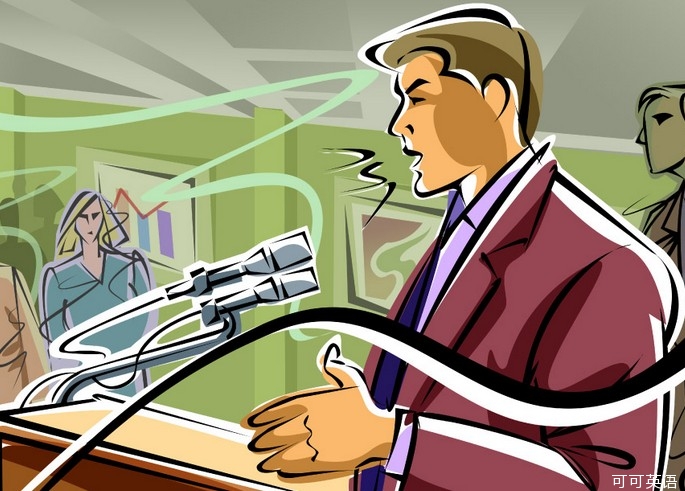(单词翻译:单击)

Asure sign the economy is recovering: more invitations for paid speaking engagements. During tough times the frequency of such gigs slumps because everyone wants a speech for free. But recent experience suggests that budgets have been boosted, and diaries are busier.
经济复苏的一个明确迹象是:有偿演讲的邀请越来越多了。在经济困难时期,这类演讲大幅减少,原因是谁都不想为演讲掏钱。但近来我的经历表明,相关预算已经增加,演讲日程也变得更繁忙了。
I usually only undertake gratuitous speaking assignments if they fall into one of two categories: either the sponsor is a charity where I have some connection; or the occasion is directly relevant to my work.
我通常只接受无偿的演讲任务,前提是它们属于下列两类之一:要么主办方是一家与我有联系的慈善机构,要么这个活动与我的工作直接相关。
Over the years I’ve learnt to be firm: otherwise you can end up travelling hundreds of miles at your own expense to address an audience of four in a village hall – without even so much as a thank you afterwards.
这些年来,我已经学会了坚持上述原则,否则你可能千里迢迢自费来到一个村庄的议事厅,结果发现观众只有四个人,而且他们在演讲结束后连句谢谢也不说。
For the past decade I’ve probably delivered between 30 and 50 speeches a year, the substantial majority gratis. Of course I enjoy it – both preparing and performing – otherwise I wouldn’t do it.
过去十年间,我大概每年做30到50场演讲,其中多半都是无偿的。当然,我享受演讲——包括从准备到演讲的全过程——否则我就不会去做这件事。
The fact is nowadays virtually all ambitious executives are required to present in a public forum in a fluent and confident way. There are ever more conferences, conventions, seminars, symposiums and suchlike. In the age of digital communication, such face-to-face oration becomes even more important. If you suffer a phobia about public speaking – as many do – then I recommend you organise media training. If you choose the right instructor it can work wonders.
当今,几乎所有心怀抱负的高管都必须有能力在公开场合流利和自信地发表演讲。小会、大会、研讨会、座谈会……诸如此类的活动比任何时候都多。在数字通信时代,面对面的演说变得愈发重要。如果你和许多人一样,对演讲有恐惧感,那么我建议你接受媒体素养训练。只要找对教练,就会有意想不到的效果。
Apart from certain rules about which bookings to accept, I have learnt first-hand my limitations when it comes to execution. I never drink before my slot: alcohol is sure to impair your performance – and you will enjoy a glass a great deal more when you sit down after the act.
除了一些在接受演讲预约时需要遵循的原则,我从亲身经历中学到,在演讲时不能做什么。我从来不在上场前饮酒,因为酒精势必会让你的表现打折扣。而当你在演讲后坐下来时,则可以更尽情地享受一杯酒的乐趣。
Meanwhile, I always draft my own material: at Channel 4 TV when I was chairman, the very competent PR supremo wrote a speech for me, but it just wasn’t my style, and I felt a fake reading his lines. It takes time to compose an address, but at least it means your pitch is authentic.
另外,我向来都是自己打草稿。我担任第四频道(Channel 4)董事长那会儿,公关主管为我写了一篇演讲稿。他非常能干,但这稿子就是不符合我的风格,所以我感觉自己是在冒充别人照本宣科。自己写稿子虽然很费时间,但至少这是你真实的心声。
I never use tools such as PowerPoint. I think these devices distract from the content – listeners don’t know whether they should be listening to you or scribbling down the bullet points from your slides. And the audiovisual system so often packs up, leaving you without a prop in mid-flow.
我也从来不用PowerPoint这样的工具。我认为,这些工具使人们不能集中精力关注演讲内容——听众不知道是该听你演讲,还是匆忙记下幻灯片上一条条的内容。何况视听系统卡壳出错的时候太多了,这使你在讲到一半时没了依靠。
I try to hold the attention of the crowd without visual props but with my words. That means avoiding jargon, and putting forward ideas with impact that can inspire.
我设法凭我的语言来抓住人们的注意力,而不是借用视觉方面的辅助。这意味着要避免专业术语,并提出令人启迪的观点。
After all, straightforward information is available everywhere: what audiences desire at a live event is something uplifting and memorable.
毕竟,内容直白的信息从哪儿都能获取:观众渴望从现场活动中得到的是一些提升心智、能给他们留下深刻印象的信息。
I can’t really tell jokes so don’t attempt to craft witty speeches. At the Edinburgh Festival I have witnessed at close quarters many dozens of brilliantly funny stand-up comedians do their acts. They are full-time experts, and what they do is really difficult for amateurs to pull off.
讲笑话我实在不在行,因此就不费力去构思机智幽默的演讲。在爱丁堡艺术节(Edinburgh Festival)上,我近距离目睹了许多令人捧腹的脱口秀演员的表演。这些人是全职从事滑稽表演的专家,他们的工作对业余爱好者来说真的很难搞定。
It takes great skill and practice to make audiences laugh, and if you fail your speech will disappoint. I recommend that you only try to be amusing if you know you have the gift and are willing to put in the time to rehearse.
让观众发笑需要高超的技巧和大量的实践,一旦失败,你的演讲会叫人失望。我的建议是,在知道自己有天赋、也愿意投入时间反复演练的前提下,再尝试制造幽默。
Usually I am willing to give talks only on topics I know well and where I have something to say – subjects that matter, where I possess personal experience, so that my stories resonate.
通常,我只愿对我熟悉的、有话可说的话题发表演讲。话题要有重要性,有我个人的经历在里头,以便让我的故事引起共鸣。
Typically a host will ask me to speak for 30 or even 45 minutes. But I know that at most modern gatherings the attendees do not want to sit and listen to such a long monologue. They much prefer a punchy 15- or 20-minute piece and then interaction and participation. My father once told me always to make your speech slightly shorter than the audience was expecting – and I think he’s right.
一般来说,主办方会让我讲30分钟、甚至45分钟。但我知道,在多数现代会议中,与会者不想坐下来听一个人讲这么长时间。他们更喜欢一个15或20分钟的简短有力的发言,然后进入互动和参与环节。父亲曾告诉我,永远要让你的演讲比观众预期的时长稍短一点,我想他是对的。
Hence I always suggest an extended question and answer session rather than a droning speech that bores people. Moreover, questions are actually more fun and challenging. You cannot really prepare in advance, and you are more likely to say something indiscreet or controversial in response than during an entirely scripted rendition.
因此,我总是建议延长问答环节,而不是絮絮叨叨讲个不停,让观众感到无聊。观众的问题其实更有趣,也更有挑战性。你真的没法事先准备,比起完全照稿进行的演讲,你也更有可能说出一些未经缜密思考的话,或是引发争议的话。
Giving speeches is ultimately a form of showing off, yet mastering the art can be both satisfying and good for one’s career.
演讲归根到底是一种表现自我的形式,而掌握演讲的艺术,不仅会给人带来满足感,也有利于事业的发展。
The writer is chairman of Risk Capital Partners, a private equity firm, and The Centre for Entrepreneurs
本文作者是私人股本公司Risk Capital Partners董事长,独立智库The Centre for Entrepreneurs主席。


